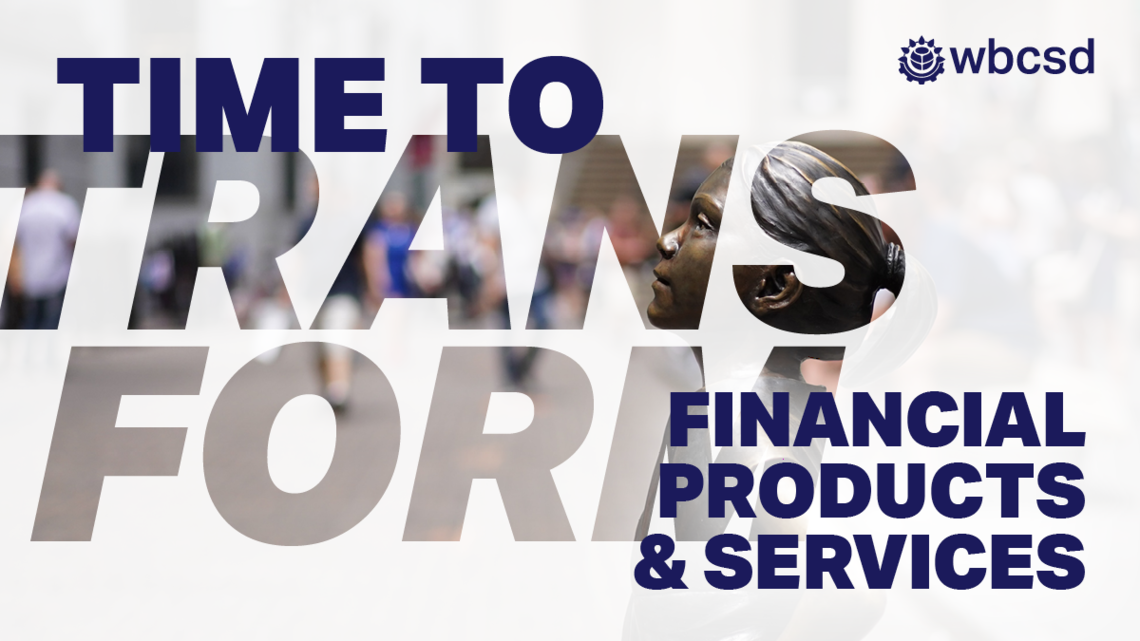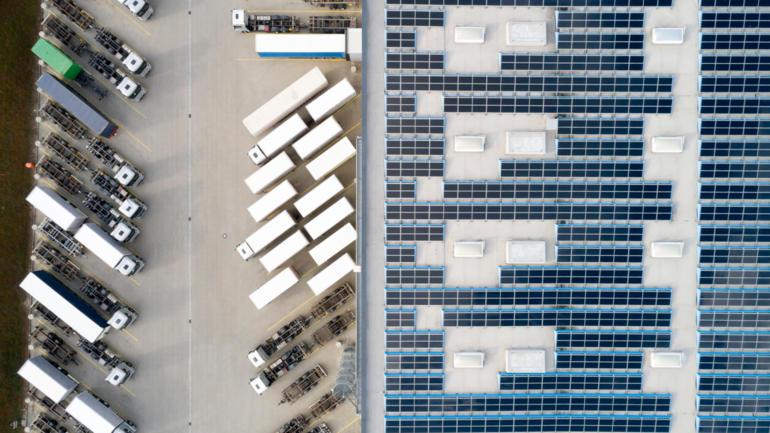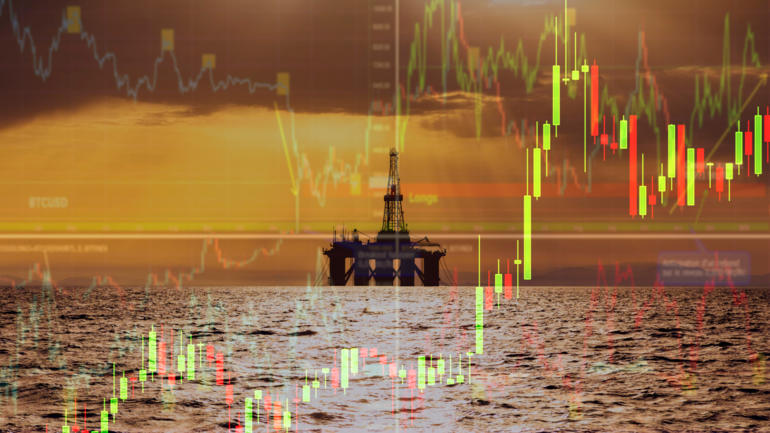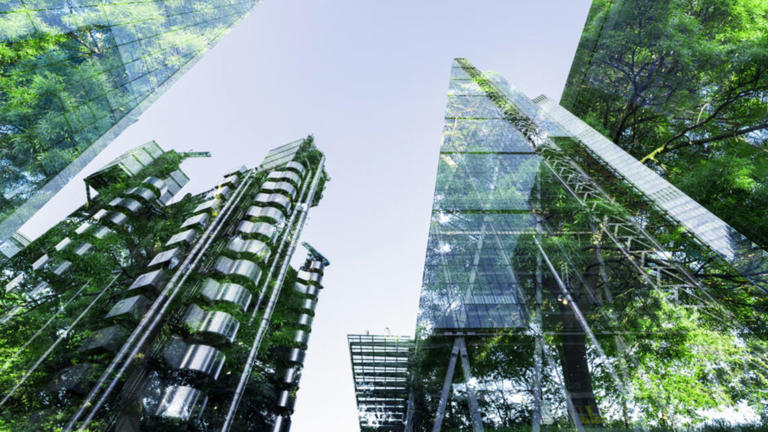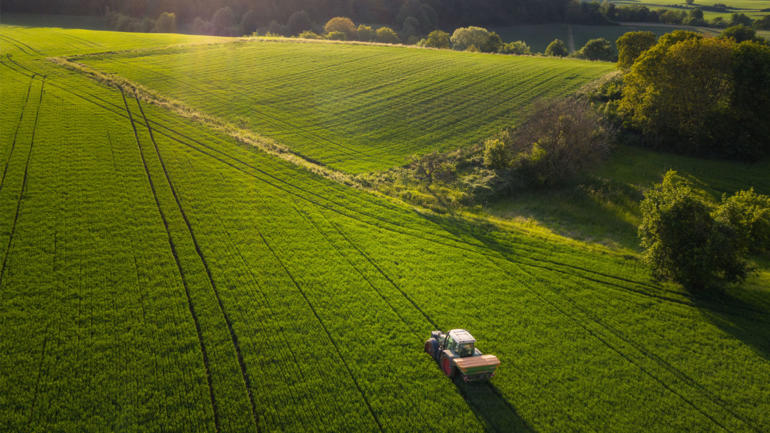Vision 2050: Time to Transform is WBCSD’s framework for business action in line with the urgency of the challenges, and opportunities, that we face as global societies. It offers companies comprehensive and ambitious guidance on how they can lead the transformations needed to bring about a world in which 9+ billion people can live well, within planetary boundaries, by 2050.
At the heart of Vision 2050, are nine transformation pathways representing the essential products and services that societies need and that business exists to provide. I’m excited to provide a deeper look into the Financial Products & Services pathway and the work that we’re doing to drive progress in this space with our member companies.
Financial services and investments are at the center of all economic activity, underpinning, underwriting and driving action and outcomes across all industrial and service sectors: they are vital to ongoing social and economic stability and resilience. Vision 2050’s Financial Products & Services transformation pathway considers both products (financial mechanisms and transactions) and services (the means by which financial products are delivered and monitored), and sets out how business can orient these towards supporting and driving sustainable development.
Our vision is that “all financial capital and financial products and services are mobilized to support sustainable development.” The vision expands on how the societal needs from Financial Products & Services will be met in 2050, requiring business to ensure that:
- The financial system recognizes the value of social and environmental outcomes alongside financial performance.
- Financial capital allocation enables sustainable. development.
- The financial system has access to comprehensive and comparable data on corporate sustainability performance
- The financial system works for everyone.
Meeting our vision for Financial Products & Services requires action by both the business and the finance sector to align and work together to drive the recognition and valuation of a sustainable future. WBCSD’s Redefining Value program is focused on making this possible, with a series of projects and interventions to embed sustainability as a strategic issue through its integration (by companies) and reward (by investors).
Our activities focus on the shared “plumbing” of the financial system and we are involved in initiatives that are evolving how sustainability is recognized, accounted for and ultimately valued. These include the Capitals Coalition, the Value Balancing Alliance, work with the EU’s Transparent project to develop the principles and practice of corporate natural capital accounting, and our developing collaboration with the PRI (Principles for Responsible Investment).
In addition, our own projects support companies in a number of areas, equipping them to:
- Develop governance and board capacity fit for the future
- Understand and respond to environmental, social and governance (ESG)-related risks through effective enterprise risk management using our guidance developed with COSO
- Develop the timeliness, quality and reliability of the data and information they use for internal management and external disclosure to meet the needs of investors and other stakeholders
- Drive the practice of investor engagement to put sustainability at the heart of their communication to capital market actors.
Investors and other actors in the financial system need to recognize and reward well run, sustainable companies that are fit for long term success. To do this, clarity and consistency of metrics are fundamental, as is the ability to understand how companies are approaching sustainable transition. This manifests through our work with the TCFD (Task Force on Climate-related Financial Disclosure), allowing companies and investors to understand the risks that climate change poses to business and investment success, and in the innovation and evolution of approaches to emerging risks, such as the TNFD (Task Force on Nature-related Financial Disclosures).
Our work to define what a better run, more sustainable, company is, advances the mutual recognition of good practice and performance, by companies and capital market actors. Our guide to Future-Proof Business presents a blueprint to support companies in defining the scope, scale, and specifics of how their businesses need to evolve through the lenses of corporate purpose, strategy and governance; systems, and; performance. It is designed to help companies be recognized and rewarded financially by capital market actors and wider stakeholders.
The achievement our vision for Financial Products & Services is closely linked to the “reinvention” mindset shift that Vision 2050 advocates: recognizing that our current system of capitalism is producing unsustainable outcomes and that generating long-term sustainable returns will require a transformed model of capitalism that rewards true value creation, rather than value extraction.
It will also interact with changes in the ways that companies (rather than financial institutions) direct investment toward socially and environmentally, as well as financially, sustainable outcomes – using finance & investment to accelerate, enable and scale transformation.
The pathway itself lays out a comprehensive series of transitions specific to financial products and services that progress towards our vision will be dependent on: markets and financial institutions will need to embrace a broader concept of value, while culture and behavior shifts away from short-termism, excessive speculation and instead leverages and fosters long-term resilience and value creation; capital is mobilized in support of sustainable development and at the same time robust market infrastructure for financial products in support of sustainable development emerges; this infrastructure is made possible by companies enhancing the strategic integration and reporting of ESG, facilitating sustainable capital allocation by financial institutions; and, people’s values are restored to the heart of the financial system and financial services to support inclusion and equitable access at scale.
As well as these transitions, the pathway proposes 10 prioritized action areas for business to focus on over the course of the next decade to accelerate the pace and scale of change. These action areas span innovative products, services and business models, as well as ways that companies can help create the right enabling conditions for change. Vision 2050’s 10 business action areas for the Financial Products & Services pathway are:
- Advocate for an enabling sustainable finance policy environment that supports transparency, evolution of concepts of fiduciary duty and strategic approaches to valuing externalities.
- Companies incorporate ESG-related risks and opportunities and natural, social and human capital impacts and dependencies into accounting processes and valuation assumptions.
- Asset owners build clear and consistent ESG requirements and performance metrics into the instructions given to investment consultants and asset managers.
- Retail and investment banks embed sustainability throughout their business models, developing a range of sustainable finance instruments, ensuring their own loans and investments are sustainable, and developing robust analysis of ESG factors on the sell side.
- Corporates and investors come together with standard-setters and regulators to develop clear guidance on the specification, consistency, and comparability of decision-useful sustainability-related information and communication.
- Identify and address incentives that reward and give rise to short-term financial performance outcomes at the expense of sustainable development.
- Credit ratings agencies enhance their analysis of the ESG risk exposure of sectors and companies for a range of issues including climate change, human rights, nature loss, and water scarcity.
- Support professional development standards and codes of ethics that support sustainable finance capabilities and behaviors.
- Develop investment allocation transparency for beneficiaries, pension holders and other retail investors, so that they can see where and how their money is invested, as well as associated sustainability-related impacts.
- Facilitate access at scale to financial products and services, using accessibility as a fundamental design principle to support equity and financial inclusion while also exploring new partnerships and initiatives to enhance financial literacy globally.
These actions are all aligned with the achievement of the Sustainable Development Goals, translating SDG ambitions and targets into clearly actionable areas of business activity.
Join us in driving collaboration across the above priority action areas, so that together we can all invest in our future.
VISION 2050 INSIGHT SERIES
This article is part of an ongoing insight series into WBCSD’s Vision 2050: Time to Transform.
Introduction: Julian Hill-Landolt, Director, Vision 2050, introduces the Vision 2050: Time to Transform insight series and provides an overview of the topics that will be covered.
Living Well: Filippo Veglio, Managing Director, People & Society, takes a deeper look at what it means to “live well” – a world in which everyone’s dignity and rights are respected, basic needs are met, and equal opportunities are available for all.
Living within Planetary Boundaries: Diane Holdorf, Managing Director of the Food & Nature Program, and Claire O’Neill, Managing Director of the Climate & Energy Program, take a deeper look at what it means to “live within planetary boundaries”.
We can provide healthy diets for all: Diane Holdorf, Managing Director of the Food & Nature Program, explores Vision 2050’s Food pathway.
We can connect people: Constant van Aerschot, Director WBCSD Asia Pacific, talks with Fujitsu’s Mel Melis about Vision 2050’s Connectivity pathway.
We can keep the water flowing: Joe Phelan, Director WBCSD India, provides an overview of our Water & Sanitation pathway and reflects on its importance in India.
We can keep on moving, smarter: Wei Dong Zhou, Director WBCSD China, interviews WBCSD’s Director Mobility Thomas Deloison about Vision 2050’s Transportation & Mobility pathway.
We can make things, smarter: Federico Merlo, Managing Director Member Relations and Circular Economy, digs into the Products & Materials pathway and WBCSD’s work in this space
We can make the world feel at home: Bill Sisson, Executive Director, WBCSD North America, will offer a deeper look into Vision 2050’s Living Spaces pathway.
Next Up: Claire O’Neil, Managing Director, Climate & Energy, will offer a deeper look into Vision 2050’s Energy pathway.

